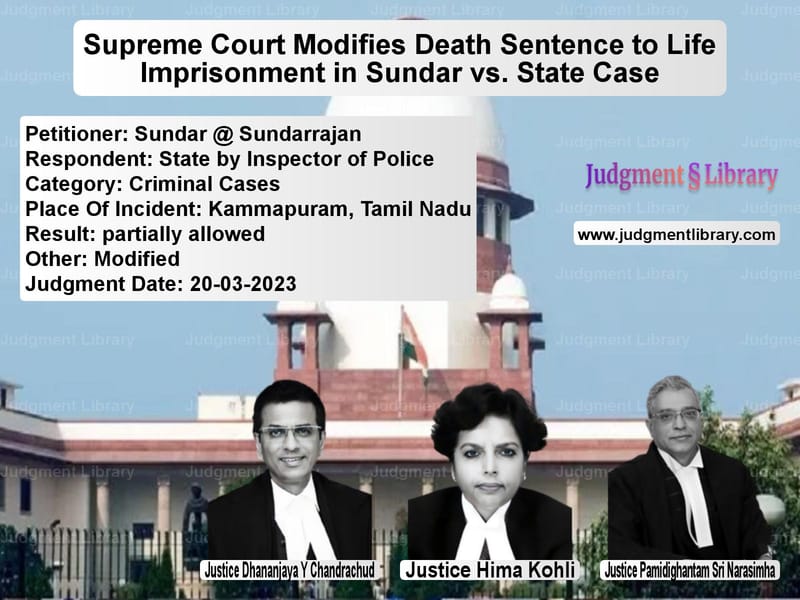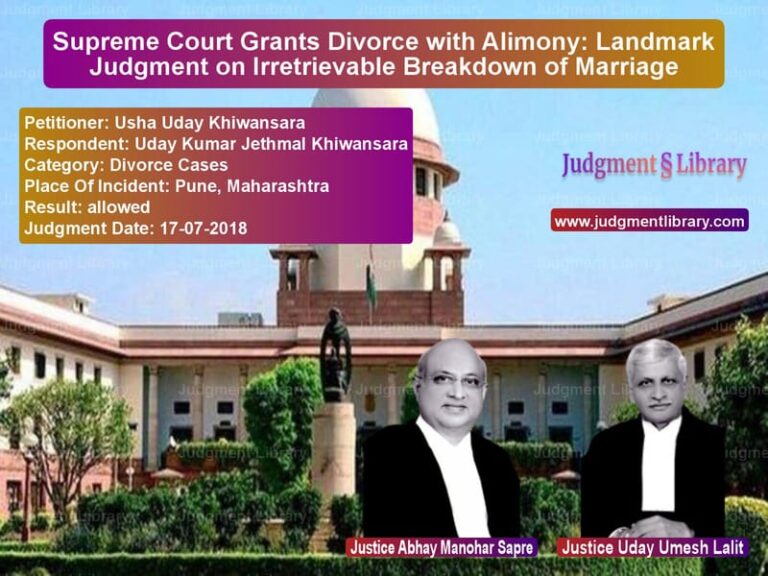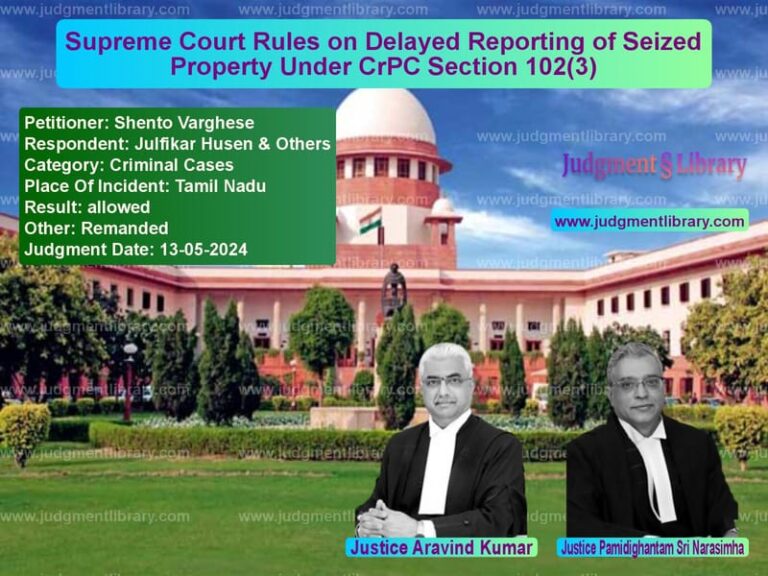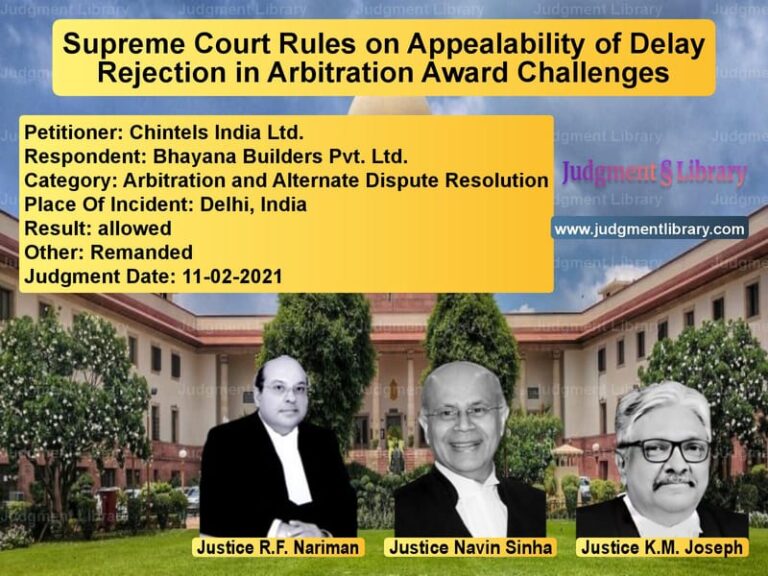Supreme Court Modifies Death Sentence to Life Imprisonment in Sundar vs. State Case
The Supreme Court of India recently reviewed its previous judgment concerning the conviction and sentencing of Sundar alias Sundarrajan in a case involving the kidnapping and murder of a 7-year-old child. The petitioner, who was on death row, sought a fresh review of his conviction and the capital punishment awarded to him. The review was granted following the precedent established in Mohd. Arif alias Ashfaq v Registrar, Supreme Court of India, which mandated that death sentence review petitions must be heard in open court rather than being decided through circulation.
Background of the Case
The case dates back to July 27, 2009, when the petitioner was accused of kidnapping and murdering a child. The prosecution alleged that the petitioner picked up the child from his school van under the pretense that his parents were unwell and later demanded a ransom of Rs. 5 lakhs from the child’s mother. On failing to receive the ransom, the petitioner strangled the child, placed his body in a gunny bag, and threw it into the Meerankulam tank.
After his arrest, the petitioner allegedly confessed to the crime, leading to the recovery of the victim’s body. The trial court convicted him under Sections 364A (kidnapping for ransom), 302 (murder), and 201 (causing disappearance of evidence) of the Indian Penal Code (IPC) and sentenced him to death. The High Court of Madras upheld the conviction and sentence, and the Supreme Court, in its 2013 judgment, confirmed both the conviction and the award of the death penalty.
Scope of the Review Jurisdiction
Under Article 137 of the Indian Constitution, the Supreme Court has the authority to review any judgment it pronounces. However, review petitions in criminal cases can only be entertained on the ground of an ‘error apparent on the face of the record.’ The petitioner argued that his conviction was based on flawed evidence and that the sentencing process did not adequately consider mitigating factors.
Arguments Presented by the Petitioner
The petitioner’s counsel put forth several key arguments to challenge the conviction:
- There was no conclusive evidence proving that the ransom calls were made from a mobile number linked to the petitioner.
- The IMEI number in the seizure memo differed slightly from the one recorded in the call detail records (CDRs), raising concerns about the reliability of electronic evidence.
- The call records were relied upon without the mandatory Section 65B certificate under the Indian Evidence Act, making them inadmissible as evidence.
- There was no direct eyewitness testimony linking the petitioner to the act of murder.
- The petitioner argued that the conviction was based purely on circumstantial evidence, and the death penalty was unwarranted under such conditions.
Arguments by the State
The State of Tamil Nadu strongly opposed the petitioner’s claims, asserting:
- The petitioner was last seen with the victim, and multiple witnesses had identified him.
- Despite the minor discrepancy in the IMEI number, the recovered mobile phones and ransom calls corroborated the prosecution’s case.
- The petitioner’s confession, combined with the recovery of the victim’s body, constituted strong evidence of his guilt.
- The death sentence was appropriate given the heinous nature of the crime and the brutality involved.
Supreme Court’s Analysis
The Supreme Court acknowledged that while the conviction of the petitioner was justified based on the evidence, there were significant lapses in the sentencing process:
- The trial court did not conduct a separate hearing on sentencing, as mandated by Section 235(2) of the Criminal Procedure Code.
- No effort was made to assess the petitioner’s potential for reformation or rehabilitation before imposing the death penalty.
- The courts did not consider any mitigating factors, including the petitioner’s young age, lack of criminal antecedents, and behavior in prison.
- While the brutality of the crime was a key aggravating factor, the law required a balanced approach that also weighed the convict’s personal circumstances.
Sentencing & Mitigation
In reviewing the sentence, the Court referred to the Bachan Singh doctrine, which states that the death penalty should only be imposed in the ‘rarest of rare’ cases where the convict is beyond reformation. The Court also cited Rajendra Pralhadrao Wasnik v State of Maharashtra, emphasizing that reformation must be seriously considered before awarding capital punishment.
The Court further noted the affidavit from prison authorities, which stated that:
- The petitioner had maintained satisfactory conduct in jail.
- He had no other criminal cases against him.
- He had completed a diploma in food catering during his incarceration.
- However, the affidavit omitted an important detail—an escape attempt by the petitioner in 2013, which raised concerns about the reliability of the information provided.
Judgment and Conclusion
After considering all factors, the Supreme Court concluded that while the petitioner’s crime was grave, the sentencing process had been flawed. The Court ruled:
- The conviction for kidnapping and murder was upheld.
- The death penalty was commuted to life imprisonment.
- The petitioner must serve a minimum of 20 years without remission.
- Suo moto contempt proceedings were initiated against the police for misleading the court by withholding material information.
This judgment reaffirms the necessity of a fair sentencing process in capital punishment cases and highlights the judiciary’s commitment to ensuring justice is served with due regard to both the crime and the criminal.
Read also: https://judgmentlibrary.com/supreme-court-acquits-murder-convict-pradeep-kumar-freed-after-19-years/
Petitioner Name: Sundar @ Sundarrajan.Respondent Name: State by Inspector of Police.Judgment By: Justice Dhananjaya Y Chandrachud, Justice Hima Kohli, Justice Pamidighantam Sri Narasimha.Place Of Incident: Kammapuram, Tamil Nadu.Judgment Date: 20-03-2023.
Don’t miss out on the full details! Download the complete judgment in PDF format below and gain valuable insights instantly!
Download Judgment: sundar-@-sundarrajan-vs-state-by-inspector-o-supreme-court-of-india-judgment-dated-20-03-2023.pdf
Directly Download Judgment: Directly download this Judgment
See all petitions in Bail and Anticipatory Bail
See all petitions in Fraud and Forgery
See all petitions in Custodial Deaths and Police Misconduct
See all petitions in Judgment by Dhananjaya Y Chandrachud
See all petitions in Judgment by Hima Kohli
See all petitions in Judgment by P.S. Narasimha
See all petitions in partially allowed
See all petitions in Modified
See all petitions in supreme court of India judgments March 2023
See all petitions in 2023 judgments
See all posts in Criminal Cases Category
See all allowed petitions in Criminal Cases Category
See all Dismissed petitions in Criminal Cases Category
See all partially allowed petitions in Criminal Cases Category







